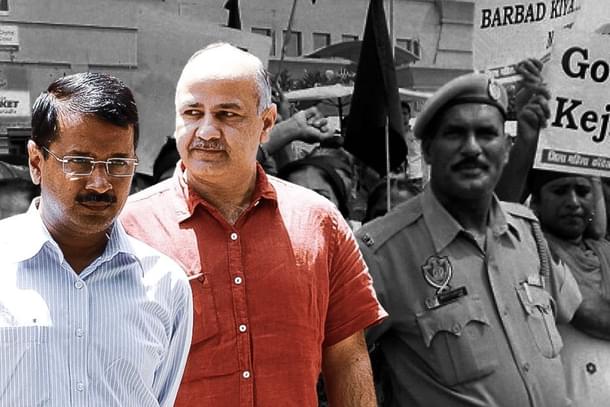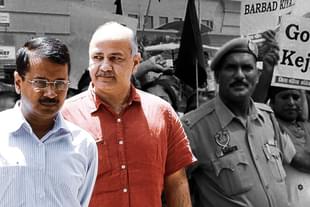News Brief
CAG Report Flags Major Concerns In Delhi’s Mohalla Clinics: Short Consultations, Medicine Shortages And Infrastructure Gaps
Vansh Gupta
Feb 28, 2025, 03:47 PM | Updated 03:47 PM IST
Save & read from anywhere!
Bookmark stories for easy access on any device or the Swarajya app.


Delhi’s mohalla clinics, which the Aam Aadmi Party (AAP) government claimed to be a flagship governance primary healthcare model, have come under intense scrutiny following an audit by the Comptroller and Auditor General (CAG), reported The Economic Times.
The report highlights significant operational lapses, including inadequate consultation time, medicine shortages, and critical infrastructure deficiencies, raising concerns about the effectiveness of the healthcare model.
70 Per Cent of Consultations Last Less Than a Minute!
One of the most alarming revelations in the CAG report is that doctors at mohalla clinics often spent less than a minute per patient.
The audit found that 70 per cent of patients who visited the Mohalla clinics between October 2022 and March 2023 received consultations lasting under a minute, raising serious doubts about the quality of medical care being provided.
In addition to time constraints, the report flagged shortages of essential medical equipment such as pulse oximeters, glucometers, X-ray viewers, thermometers, and blood pressure monitors, which are crucial for even basic diagnosis and treatment.
18 per cent of Mohalla Clinics Shut for 15 Days to 2 Years!
The non-functionality of several mohalla clinics emerged as another major concern. The audit found that 18 per cent of the clinics remained non-operational for durations ranging from 15 days to nearly two years.
Doctor shortages, resignations, and de-empanelment were cited as the primary reasons behind these prolonged shutdowns.
In four key districts—North East, South, South West, and West—41 out of 218 clinics were non-operational at the time of the audit, severely impacting healthcare accessibility for residents.
Even the Essential drugs were not Stocked up!
The non-availability of essential medicines was another critical issue flagged in the report.
A review of 74 mohalla clinics revealed that none had a complete stock of the 165 essential drugs listed in the Essential Drug List (EDL).
Supply chain inefficiencies resulted in frequent shortages, with suppliers failing to fulfill orders or delivering medicines with delays ranging from three to six months.
This lack of timely access to medicines further compromised the ability of mohalla clinics to provide effective treatment to patients.
Adding to the crisis, laboratory services were completely unavailable in Mohalla clinics between 16 November 2022 and 14 December 2022.
The absence of alternative arrangements for diagnostic tests severely limited the scope of medical services, leaving patients without essential diagnostic support.
AAP's Unmet Promises and Delayed Expansion
Despite being in power for nearly a decade, the AAP government has fallen significantly short of its promise to establish 1,000 Mohalla clinics.
The report states that by March 2023, only 523 clinics were operational, meaning that only 53 per cent of the target had been met.
Even more concerning, only 38 new clinics were added during AAP’s second term, casting doubts over the administration’s commitment to expanding healthcare infrastructure.
Delays in project execution were also highlighted in the report.
Between 2016 and 2023, Rs 35.16 crore was allocated for constructing primary health centres, yet only 28 per cent (Rs 9.8 crore) of these funds were utilised.
This underutilisation of resources has further hindered the expansion of Mohalla clinics and their ability to serve a larger patient base.
Infrastructural Shortcomings in Clinics
Beyond operational inefficiencies, the audit revealed several infrastructural shortcomings in the mohalla clinics. Out of 81 clinics assessed, multiple deficiencies were reported:
(i) 10 clinics operated without a potable water supply.
(ii) 24 clinics lacked air-conditioning, which is essential for storing medicines safely.
(iii) 21 clinics had no toilet facilities, affecting both patients and staff.
(iv) 6 clinics functioned without proper examination tables.
(v) 29 clinics were without fire extinguishers, raising safety concerns.
(vi) 12 clinics were inaccessible to differently-abled individuals.
(vii) 20 clinics did not provide privacy screens for patients during consultations.
The monitoring and oversight mechanisms of mohalla clinics were also found to be highly inadequate.
In 2018, the Directorate General of Health Services (DGHS) mandated quarterly inspections by Chief District Medical Officer (CDMO) teams. In 2019, an additional directive required CDMOs to inspect at least one clinic per month, ensuring proper staff punctuality, pharmacy stock verification, and patient record validation.
However, between March 2018 and March 2023, only 175 inspections were conducted—just 1.5 per cent of the required 11,191 inspections across 218 clinics in selected districts.
Vansh Gupta is an Editorial Associate at Swarajya.





